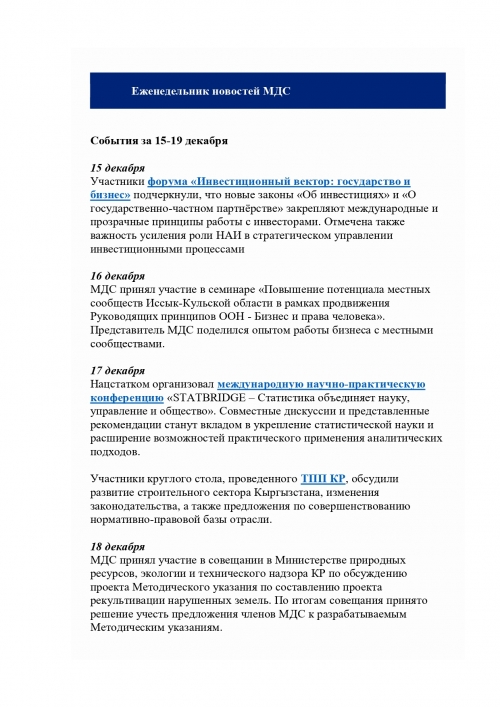Analysis /
Articles /
Kyrgyzstan restructures Government to boost investments and exports
The Jogorku Kenesh (Parliament)of Kyrgyzstan has approved a new structure of the Government, which will include two new committees while two ministries will be renamed.
The State Committee of Industry, Energy and Mining will be created on the basis of the State Agency for Geology and Mineral Resources and the State Committee for Information Technology and Communications on the basis of the Ministry of Transport and Communications.
The functions of the Ministry of Agriculture and Land Reclamation will be expanded with the food industry and the Ministry of Transport and Communications will be renamed the Ministry of Transport and Roads.
The functions of the Economy Ministry will be reduced by half while the State Inspectorate for Environmental and Technical Safety will additionally monitor mineral resources.
The changes do not involve increasing the staff and additional funding from the national budget, Prime Minister of Kyrgyzstan Sooronbai Jeenbekov said.
Industrial policy
To improve the economy, increase exports and private and public investments, it is vital to develop long-term policies in the fields of industry, energy, subsoil use, agriculture, and e-governance. Given the state of the economy, significant changes and challenges within the Eurasian Economic Union (EEU), as well as the impact of the global crisis, the Government’s new structure will help implement these initiatives, Jeenbekov added.
Industry, energy and natural recourses are the priority areas in the country’s economy and have a greater share in the GDP. The growth of these sectors will increase the budget revenue. It is difficult to achieve these goals with the current Government’s structure, Prime Minister believes.
Industrial policy has been neglected for a long time in Kyrgyzstan. Due to the heavy workload of the Ministry of Economy, it had not always had time to promptly carry out all of its functions, and industrial policy issues have remained in the background, Jeenbekov said.
The National Energy Holding created half a year ago does not have the necessary status and funds to carry out international negotiations at high political level. Kyrgyzstan's membership of the EEU requires an active long-term industrial policy to enter the Eurasian market.
The Energy Holding will now deal with economic issues, and the new committee will develop the policy in the energy sector.
Mining generates about 50% of the industry’s income but state policies in subsoil use and mining have remained in the background. The authority of the State Agency on Geology and Mineral Resources is not sufficient to carry out coordination work. Therefore there was a need to create a single state body responsible for developing and coordinating a comprehensive inter-sectoral policy in the industrial sector, subsoil and energy in the form of the State Committee which will develop and implement state policies in subsoil use, industry and energy sector.
E-government project
Creation of e-government will minimize contact between public officials and citizens and thus help strengthen the fight against corruption. According to Prime Minister, 373 services and 96 types of permits will be transferred to the electronic format. To implement the project, donor funding is planned to be used, and there is a preliminary agreement on the allocation of $2 million for the purchase of equipment.
Four ministries and 10 state-owned enterprises and institutions are currently working in this area. More than 2.5 billion soms, of which 2 billion soms in donor funds, have been spent since 2011 to implement the e-government and ICT project which has not been completed due to the spraying of funds between government agencies.
The new State Committee for Information Technologies and Communications has to effectively introduce the e-government.
Processing industry
In the Eurasian Economic Union, Kyrgyzstan has to reduce re-exports and increase production of domestic products.
Kyrgyzstan has a great export potential but now the country exports mainly raw agricultural produce.
The food industry is closely linked to agriculture, and it is necessary to create a competitive export-oriented processing industry by introducing new technologies and know-how, and to develop the food industry, such as dairy, meat, fruit and vegetable, and others. The new Ministry of Agriculture, Irrigation and Food Processing will be responsible for this.
Criticism
MP Iskhak Masaliyev blamed the Government for its unwillingness to optimize the Government structure and reduce the bureaucracy. “During the crisis we have to optimize costs and downsize the staff, but the Government is creating additional state bodies,” he said.
According to MP Cholpon Jakupova, one of the tools of optimization would be electronic control. Structural reforms of the Government have already been planned from time to time but there have been no results so far.
Creation of the State Committee of Information Technology and Communications will badly influence Kyrgyzstan’s membership in the WTO, parliament deputies said. According to the Association of Communication Operators of Kyrgyzstan, creation of an independent communications regulator which would not be engaged in certain policies in this area was among Kyrgyzstan’s obligations during its accession to the WTO. The creation of the State Committee may cause risks for Kyrgyzstan’s WTO membership, as the new body will combine both economic and supervisory functions.




























